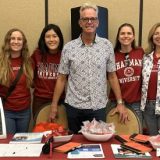
Alumni Spotlight: Deena Fam ’15 Communication Sciences & Disorders alumna talks to us about life as an "SLP"
October 25, 2018
CHBS: What initially drew you to the field of Communication Sciences and Disorders (CSD)?
DF: I was originally drawn to the field of speech-language pathology (SLP) from a personal experience in which I observed a clinician working her hardest to help a patient communicate after a severe stroke. This experience was at Mission Hospital over ten years ago, and that clinician inspired me not only to become a speech-language pathologist, but to specifically work at Mission Hospital.
CHBS: Where do you work and what are the primary responsibilities of your role?
DF: I am a full-time speech-language pathologist at Mission Hospital in Mission Viejo, CA. I am currently the head SLP in the acute rehabilitation unit and primarily lead the Neuro team (strokes, traumatic brain injuries, neurological diseases, etc). I currently assess and treat adults with acquired brain injuries, set functional goals, create treatment plans, as well as lead in rounds and weekly meetings with the interdisciplinary team. I complete Modified Barium Swallow Studies and Fiberoptic Endoscopic Evaluation of the Swallow exams for patients who have dysphagia. I assist with Concussion Clinic and attend Aphasia group with the outpatient therapy team occasionally. I have multiple trainings/certifications within the field including, FEES, Stroboscopy, CBIS, LSVT-LOUD, CRT, and am in the process of completing Beckman Oral Motor, VitalStim and PROMPT courses. I also supervise graduate students in their medical rotations and CFYs. I am also seeing private patients with the hopes of starting my own private practice in the future.
CHBS: What are your long-term career goals?
DF: My long-term career goals include advancing my education and possibly returning to school for a doctoral degree and/or becoming a board certified ANCDS member. I have particular interests in the areas of mild traumatic brain injuries and Apraxia of speech. Eventually, I would love to return to the classroom and teach courses (particularly neurology or multicultural studies) at a university.
CHBS: How did the Communication Sciences and Disorders (CSD) Program prepare you for your current role?
DF: The CSD program prepared me immensely for my current role. I not only learned from the classes in the program, but also from the community service opportunities and clinical practicums. I am confident that Chapman CSD gave me the values of good work ethic, teamwork, and love for the field in my current role. The CSD program required that each student complete a minimal number of community service hours over two years, and I found that my constant interactions with families and individuals with speech and language disorders as well as acquired brain injuries have helped shape my role as a clinician. I completed over 50 community service hours and the memories and lessons I learned gave me more than I could’ve hoped for. Also, the guidance I received from my professors and the countless opportunities they gave me to immerse myself into the field, significantly influenced my style as a clinician. Their expertise as outstanding clinicians shaped my life in many ways. Their doors were never shut-they gave us many opportunities to learn from their experiences within the classroom, during office hours and within the field. They encouraged us to ask questions, research our answers, and to lift each other up as a cohort. I learned to work with my classmates and this shaped my interdisciplinary role as the lead rehab SLP significantly. The classes were thorough and were always challenging. I especially loved two courses: AAC and Neurology. The curriculum was intense, and the expectations were high, however I am certain that the heavy workload combined with the outstanding clinical practicums helped shape my work ethic.
CHBS: Can you talk about your experience working in the Adult Learning Lab? How did it prepare you for your current role?
DF: I recall working in the Adult Learning Lab in January 2015. I worked in there as part of my third clinical practicum, and I still remember every moment of my time there. I had an individual who I worked with for four hours every day for two weeks. He was a young man who had a severe traumatic brain injury, and his small steps towards success were not only huge for him, but huge for me as a beginner clinician. He was one of the first young adults I had worked with, and the adult learning lab gave us both a safe space to learn from each other and to meet his goals (and mine). This interaction was a stepping stone for me as a clinician who was eager to work in a medical setting with adults. I knew from that moment that I was destined to work with the population of individuals with acquired brain injuries.
CHBS: Any final thought on your experience as a CSD grad student at Chapman?
DF: Chapman CSD gave me not only wonderful memories and great colleagues, but also a foundation that I will forever cherish as a medical speech-language pathologist. The faculty, the experiences, the classes, community service opportunities, and the constant learning created a hard-working clinician who loves every single moment of her job. I strive to learn from my colleagues and patients every day and I am eager to advance my knowledge in the field every opportunity I get. The great network that the CSD program has created with various clinicians in the community has helped me get my dream job and has also kept other doors in the SLP world open for me. I am forever grateful for Chapman CSD and I know that I am indebted to those professors and individuals who helped shape my career.

